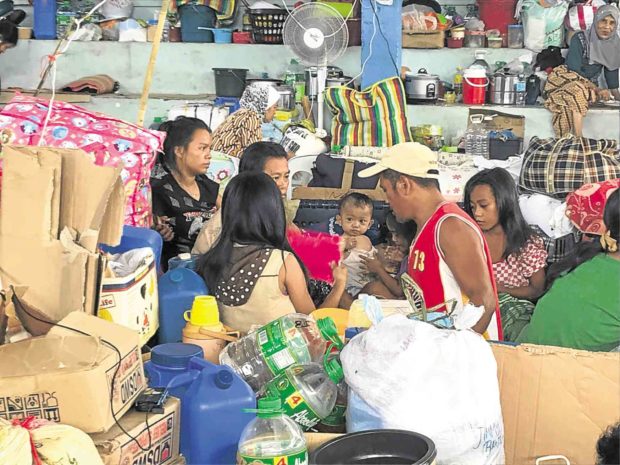Displaced Marawi folk need more help as condition worsens in evacuation sites, exec says

Families who fled Marawi City share every available space in an evacuation center in Iligan City as fighting in their hometown continues. —ALLAN NAWAL
MARAWI CITY—As the military sustains the battle to flush out the Maute terror group from this city, the national government must also step up efforts to help people displaced by the fighting that started on May 23, an official of Lanao del Sur province said.
Zia Alonto Adiong, spokesperson for the provincial crisis management committee (CMC), made the appeal on Wednesday as he confirmed the deaths of 33 evacuees from various diseases.
“We have 33 deaths so far—10 due to diarrhea and severe dehydration, five to sepsis and four to pneumonia,” Adiong said, adding that the rest were due to stroke and other illnesses.
Adiong did not specify the victims’ age groups but said those who suffered from stroke were mostly “home-based” evacuees or those staying outside designated evacuation sites.
Worsening conditions
Article continues after this advertisementHe said the CMC was not saying that the services being provided by the national government were lacking, but as the fighting dragged on, the situation of evacuees was getting worse.
He said evacuation centers had started to become filthy due to constant rains, adding that food supplies in other sites were projected to dwindle in the coming days.
According to Adiong, the national government is capable of providing more help, “aside from the military action that is now taking place.”
“We are not saying it’s lacking but [there’s a need to] intensify and be more aggressive. There are, for example, 50,000 individuals also affected by the fighting in the second district (of Lanao del Sur), who really are in need of relief and medical services. We also have pregnant women in evacuation centers that may need immediate attention,” he said.
At least 264,000 people fled this city when the fighting started more than a month ago.
Adiong said diseases continued to stalk evacuees as health workers could only do so much with limited medical supply, personnel and logistics.
“We have put up mobile clinics to provide immediate assistance to our internally displaced persons, who may require immediate medical assistance,” he said.
Medical needs
But Adiong said their efforts were not enough because of the sheer number of evacuees.
The provincial government has 40 doctors, 20 nurses and a support staff, but these medical personnel look after evacuees in at least 10 towns outside Marawi.
He said that because of the growing number of evacuees needing medical attention, the provincial government was facing problems of depletion of medical supplies, transportation and safe routes to reach evacuees outside the city.
“We continue to appeal to the national emergency response center particularly for medical resources and manpower to maintain the health security of [evacuees],” Adiong said.
He said it was good that no outbreak of diseases had taken place in evacuation centers as of Wednesday, but the stress being experienced by evacuees, coupled with dehydration due to the lack of water supply and the shortage of nutritious food, made them more vulnerable to illnesses.